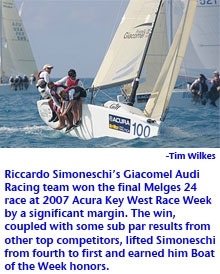
FirstBeatSimoneschi
Though the stage changed only subtlety throughout the five days of 2007 Acura Key West Race Week, the Melges 24 regatta unfolded like a play with three distinct acts. The first act was the Joe Fly show. Giovanni Maspero’s veteran team dominated the first five races in the 47-boat fleet, finishing each in the top three. It was an impressive accomplishment in a difficult class and staked the Italian team to a 15-point lead. During the second act, races 6 through 8, the top boats constricted as if on a rubber band. A 20th in Race 6 left Joe Fly clinging to a two-point lead over Dave Ullman’s Pegasus 505, with Franco Rossini’s Blu Moon just three points further back in third. Race Week rules allow for a throwout after seven races, but with a 12th in Races 7 and 8, Joe Fly was still just barely in front. Meanwhile, Riccardo Simoneschi’s Giacomel Audi Racing had quietly advanced from sixth after Day 3 to fourth after Day 4.The final act was the final race. With each contender carrying a hefty, double-digit drop, the championship was within reach of half a dozen teams. In the end it was Simoneschi’s team that grabbed the top trophy with both hands, winning the final race by a quarter mile while Joe Fly finished 14th, Blu Moon eighth, and Pegasus 505 12th. We spoke with Simoneschi, a veteran Star and big boat sailor from Milan, Italy, not long after he collected his prizes for top Melges 24 and Boat of the Week.Tell us what it’s like to win the Boat of the Week honors at 2007 Acura Key West Race Week?It’s great. We did it already in the SORC with the Melges. A few years ago we were Boat of the Week. So it was great to make the couple here with Key West. Last year in Key West, we were first until the last race and then we finished fourth so this year we were really excited to make it. And we did it.So it was a bit of a role reversal this year. Last year, you were in first heading into the final race and lost the regatta. This year it was Joe Fly that had the lead, but you were able to get past them in the final race.Today we had a fantastic race. We were probably more consistent than the other leading boat. They felt the pressure. We are longtime sailors in the Olympic classes so we are used to the pressure.It was a tough class to be consistent. How we you able to do that where so many other good teams struggled?We sailed in a conservative way. That’s not our best condition because we like to sail with the strong wind. Light wind for us is more difficult. The boat was new so in the beginning we had a couple of problems, not because of the boat, but just because it was new. One day the pin of the rudder was too tight, so that was a problem in the light winds. In the end we just managed to be conservative and to sail consistently. Today was a tough day. We thought that the only way was to win the race, and so we tried to do it and we did it, and we won by a large margin, maybe 400 meters.Joe Fly jumped out to a strong lead after five races. Did you think you were going to be able to catch them?Well, in sailing, one thing I’ve learned is it’s never ended until it’s finished. So people get nervous and the mind can really make the difference. You never know what happens. Today we were thinking to do our best, and let the others do the rest. And they did it. When you bring this trophy home to Italy, do people understand how big a deal it is?I think so, yeah. Key West is very important worldwide. It’s a good result; it’s one of the best results in my sailing career. I did a lot in the Star class, in the big boats, TP 52s, IMS, I’m European champion, world champion. But this time it’s a good result. And I like to win in Key West, it’s a good place, a good atmosphere.For you what was most important this week, tactics or speed?Both. You can’t win without good tactics and good speed. And to be consistent, that was the big thing, to be consistent to be there all the time, fighting for every single point. It’s easy to speak about being consistent. But how do you do that on the course?To do what you know, to do what you can do. Not trying to do more than you can do. That is to be consistent. When you get nervous, you try to do more than you can and then you make mistakes. I think we work together with my tactician very well, looking for the speed, calling for the tactics. We definitely went through several problems along the way, but with the idea to be there, to be there, to be there. So you avoided gambling, putting yourself in a bad position.You get nervous; it’s part of the game, but you have to control it. It’s not like running, you get nervous and you may run faster. In sailing you get nervous and you have to quiet down and use your brain.









